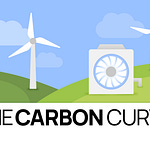Last month, the Department of Energy hosted a virtual summit convening innovators, environmental organizations, government leaders, and other stakeholders about The Carbon Negative Shot. The DOE launched this bold initiative last year to stimulate innovation in carbon removal (CDR) pathways that remove and durably store CO2 from the atmosphere at gigaton scale for less than $100/net metric ton of CO2.
I wrote about this target in a recent report I did on barriers to scaling up the carbon removal industry. In my conversations with stakeholders across the carbon removal field, there’s a widely held belief that in order to scale carbon removal we need to get the cost below this $100/ton threshold. Which I can understand, but …
Why are we anchoring to this number in particular? Is it even realistic? What exactly is included in that cost? Is that the cost to the carbon removal provider? Or is it the price to the end buyer? Does it include subsidies? How about the cost of measurement, reporting, and verification?
I think making carbon removal much more economical is absolutely necessary to successfully scale it up - and initiatives like the Carbon Negative Shot, policies like the expanded 45Q tax credit, and others will play a big role to get us there. But I think we need more precision in how we talk about cost and a better understanding of carbon removal’s many cost drivers. So I wanted to get into this topic with someone leading a carbon removal company and navigating this uncertain road - the CEO of Heirloom.
We talk about the importance of clearing up these definitions, and the ecosystem levers that can help drive carbon removal down the cost curve.
In this episode, Na’im and Shashank talk about:
A baseline definition for carbon removal
Key carbon removal cost drivers and implications for sub-$100/ton carbon removal
Challenges with storage, injection, and transportation
The ideal role of the public sector in supporting carbon removal
The importance of modularity for high technology learning rates
Other ecosystem barriers that could help drive down costs and scale up carbon removal
Relevant show links:
Heirloom’s website (see careers page and white paper)
How Solar Became Cheap by Greg Nemet
About Shashank Samala:
Shashank Samala, CEO of Heirloom, a company with a goal of removing carbon dioxide out of the air at gigaton scale by 2035 to help reverse climate change. Shashank grew up in Southeast India where he saw firsthand the impact of climate change on some of the world's most vulnerable people.
Shahank was previously an Entrepreneur in Residence at Carbon180, a leading climate policy NGO working on atmospheric carbon removal, and a founder at Tempo, which builds mission-critical electronics for surgical robots, satellites, reusable, rockets, and more, and raised over $100M from leading investors.
Shashank previously worked at Square and received his Bachelor of Science degree from Cornell University.
If you enjoyed this episode, please subscribe to this podcast on your favorite podcast app or subscribe via The Carbon Curve newsletter here. If you’d like to get in touch with Na’im, you can reach out via Twitter and LinkedIn.
Na’im Merchant is an advisor and thought partner to start-ups, policy groups, and research organizations on scaling up climate technologies to meet the monumental challenge of removing billions of tons of CO2 from the atmosphere to combat climate change. Every two weeks, Na’im will release a short interview with individuals advancing bold new ideas and taking a collective action approach to scaling up carbon removal.













Share this post